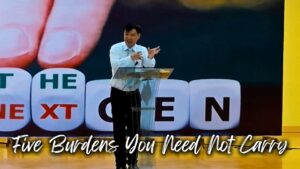KEY TEXT
Matthew 20:1-16 (NKJV)
Verse 1 – “For the kingdom of heaven is like a landowner who went out early in the morning to hire laborers for his vineyard.
Verse 2- Now when he had agreed with the laborers for a denarius a day, he sent them into his vineyard.
Verse 3- And he went out about the third hour and saw others standing idle in the marketplace,
Verse 4- and said to them, ‘You also go into the vineyard, and whatever is right I will give you.’ So they went.
Verse 5- again he went out about the sixth and the ninth hour, and did likewise.
Verse 6- And about the eleventh hour he went out and found others standing idle, and said to them, ‘Why have you been standing here idle all day?’
Verse 7- They said to him, ‘Because no one hired us.’ He said to them, ‘You also go into the vineyard, and whatever is right you will receive.’
Verse 8- “So when evening had come, the owner of the vineyard said to his steward, ‘Call the laborers and give them their wages, beginning with the last to the first.’
Verse 9- And when those came who were hired about the eleventh hour, they each received a denarius.
Verse 10- But when the first came, they supposed that they would receive more; and they likewise received each a denarius.
Verse 11 – And whey they had received it, they complained against the landowner,
Verse 12- saying, ‘These last men have worked only one hour, and you made them equal to us who have borne the burden and the heat of the day.’
Verse 13- But he answered one of them and said, “Friend, I am doing you no wrong. Did you not agree with me for a denarius?
Verse 14- Take what is yours and go your way. I wish to give to this last man the same as to you.
Verse 15- Is it not lawful for me to do what I wish with my own things? Or, is your eye evil because I am good?’
Verse 16 – So the last will be fast, and the first last. For many are called, but few are chosen.
INTRODUCTION
- Our worldly work theology
Hard work α More reward
When there numeration of pay/reward is proportional to our hard work, we call that JUSTICE.
- Controversy of this parable
The Parable of the Workers in the Vineyard.
In this parable, Jesus spells out the HEAVENLY REWARD SYSTEM which is totally in controversy to our earthly reward system.
- Title
‘REDEFINING OUR WORK THEOLOGY’
Outline:
- Background of our Key Text
- Different interpretations of the Parable
- The Right Interpretation of the Parable
- Redefining our work theology
MAIN POINTS
- BACKGROUND OF OUR KEY TEXT
The grape harvest
Impending rain
Frantic race against time to get the harvest in
The pay was perfectly normal: a denarius= the normal day’s wage for a working man.
Many men standing in the market-place, which was the equivalent of the labor exchange.
Hired day laborers dependent on CHANCE EMPLOYMENT
The hours in the parable were normal Jewish hours. Counting from 6 a.m. therefore….
- Third hour = 9 am
- Sixth hour = 12 noon
- Ninth hour = 3 pm
- Eleventh hour = 5 pm
The parable is about the different workers being enlisted at different hours by the landowner to work in his vineyard.
Though each started to work in the vineyard at the different hour, at the end of the day they all received the same pay.
The workers who worked longer hours were upset that those who worked only one hour received the same pay they did.
2. DIFFERENT INTERPRETATIONS OF THE PARABLE
Scholars interpret this parable in different ways.
Interpretation # 1
SALVATION APPROACH
Interpretation # 2
DISPENSATIONAL APPROACH
Interpretation # 3
ELECTION APPROACH
3. THE RIGHT INTERPRETATION
GRACE AND REWARD APPROACH
Jesus uses this parable to answer a question by Peter in Matthew 19:27– “See we have left all and followed you. Therefore, WHAT SHALL WE HAVE?”
Jesus’ reply came in stages.
- A PROMISE of reward
Matthew 19:28 – So Jesus said to them, “Assuredly I say to you, that in the regeneration, when the Son of Man sits on the throne of His glory, you who have followed Me will also sit on twelve thrones, judging the twelve tribes of Israel.”
- A WARNING that God’s manner of distributing reward is not necessarily the manner of men
Matthew 19:30 –But many who are first will be last, and the last first.
- An ILLUSTRATION of the principle that God’s manner of rewarding is not like man’s practice of giving rewards.
Let’s look at the different characters and sequence in this parable:
THE LANDOWNER
– went to the marketplace at 9 a.m. to hire workers for his vineyard.
-hiring continued through the day till 5 p.m.
The picture here is:
- the URGENCY OF THE HARVEST.
- INEXHAUSTIBLE SUPPLY OF WORK by the landowner to those who wanted to work.
-the landowner was SURPRISED to find people IDLE because he had plenty of work to give them.
Meanings:
- Landowner = God
- The vineyard =God’s Kingdom business.
- The marketplace=
- The workers hired at different hours =souls called by God to serve Him.
- The grapes to be harvested = the many souls to be ingathered to the kingdom of God.
- The impending rain = the coming judgment of God.
- The hiring of more laborers at different point of time =The salvation and calling of God is ongoing.
- The hiring = salvation but also to work in his vineyard.
In other words, we are not saved to be idle, but saved to work in the vineyard of God.
- Yet, there are so many Christians “idling” about in the marketplace.
“Why is any one of us remaining idle towards God? Has nothing yet had power to engage us to sacred service? Can we dare to say, “No man has hired us?”
- Till we are hired into the service of God, we are standing all the day IDLE – a sinful state.
- The market place is the world and from that we are called by the GOSPEL. A man may go idle to hell but he that will go to heaven, must be diligent.
THE CONTRACT BETWEEN THE LANDOWNER AND THE LABORERS
“whatever is right I will give you.” – verse 4
The earliest workers were promised a day’s wage which is a denarius.
The other workers hired through the day – not promised a SPECIFIC WAGE, only “WHATEVER IS RIGHT”.
DISBURSEMENT OF WAGES
At the end of the day, the landowner called the laborers and gave them their wages, BEGINNING WITH THE LAST TO THE FIRST.
The men hired last were paid first and PAID FOR A FULL DAY OF WORK.
The men who were hired at the “eleventh hour” who worked only about one hour – elated about being paid first and being paid for a FULL DAY.
THE PRESUMPTION OF THE FIRST WORKER
The first workers SUPPOSED, “If the landowner is paying these guys a full day’s pay for one hour’s work, then I will get far more.”
The order of payment was important – If the first workers had been paid first, they would not have had time to develop THE EXPECTATION OF MORE PAY FOR THEMSELVES.
“Possibly the first felt their vanity wounded by being paid after the others. They used their WAITING TIME in considering their own SUPERIORITY to the latecomers.”
Yet the man hired first – early in the day at 9 a.m. and who had worked all day – GOT PAID EXACTLY WHAT THE LANDOWNER HAD PROMISED THEM
The landowner did exactly as promised but their supposition of more pay than promised was DISAPPOINTED.
THE COMPLAINT OF THE FIRST WORKERS
The first workers complained against the landowner.
They were offended that the landowner gave the men who worked less “equal to us who have borne the burden and the heat of the day.”
This parable unveils a truth that Matthew’s predominantly Jewish audience needed to hear.
Keep in mind that Jesus gave this parable in answer to Peter’s question, “What then shall we have?” (19:27).
Offense of Peter
Our offense is also the same as Peter’s
This parable is similar to the Parable of the Prodigal Son.
In both parables, the grace shown to the undeserving person offends those who think of themselves as DESERVING.
We are glad for the mercy shown to the returned prodigal and are offended at the elder brother’s outrage.
Not so with the Parable of the Workers – We SHARE THE OFFENSE OF THE ALL-DAY WORKERS.
They have worked long and hard, but the master put them on par with all the rest.
In like manner, God has put us on par with LATECOMERS TO THE FAITH – and others who have done less or given less.
But we don’t want to be part of that. We want to be on top.
We don’t want mercy (what God gives freely) but justice (what we have earned).
If God distributes rewards fairly, we who have worked all day will get more than those who arrived at the last hour.
We will receive what we have earned plus a generous bonus.
The irony is that THE LITTLE BIT WE HAVE EARNED IS OF NO CONSEQUENCE WHEN COMPARED TO GOD’S GRACE – BONUS.
A truth all of us need to hear –
GOD CALLS US TO GIVE OURSELVES UNRESERVEDLY TO GOD’S SERVICE AND TO TRUST GOD FOR OUR REWARD. THAT GOD IS CERTAIN TO BE MORE GENEROUS THAN WE DESERVE – AND PROBABLY MORE GENEROUS THAN WE COULD EVEN IMAGINE.
We assume that it is a better deal to work one hour for a full day’s wages than to work all day for the same amount.
We fail to see how soul-killing it is
- to wait and wonder and hope;
- to have our destiny controlled by someone whose name we do not know;
- to wonder if we will be able to buy groceries for the dinner table.
Is it better to live most of one’s life without Christ – without faith, without prayer, without prayer, without hope and to pay the cost of discipleship only in one’s last day?
Those idling in the marketplace at the eleventh = those living most of their lives without Christ.
To imagine that those who find Christ on their deathbed have struck a better “deal” suggests that we do not really value our relationship with Christ – that we value the pot of gold (reward, and pay) at the end of the rainbow rather than the joy of knowing Jesus.
Such discipleship is like valuing great art only for its price tag – failing to appreciate the way that it enriches life.
Jesus has said, “Everyone who has left houses, or brothers, or sisters, or father, or mother, or wife, or children, or lands, for my name’s sake, will receive one hundred times, and will inherit eternal life” (Matthew 19:29).
The ultimate reward of faithful discipleship is eternal life.
When Jesus offers eternal life to the less deserving, He takes nothing from the more deserving.
In God’s kingdom, we can all have, as the old song promises, “a mansion just over the hilltop.”
There is no need for spiritual competition, because our reward will be as good as it could possibly be.
THE FIRST AND THE LAST WORKER
The first worker is:
- The ANGRYLEGALIST – whose work theology is JUSTICE – I should be paid in proportion to my labor. This smack of human effort. They think that salvation comes to those who work the hardest.
- Those who are converted early and have been serving God for a long time and feels
The last worker (the one-hour worker) represents:
- Those who repent on their deathbeds
- Those who battle addiction all their lives
- Those who wasted their youth and were only able to give Jesus their withered last years
- Those who are tax collectors, the prostitutes, the outcast
THE HEART OF THE LANDOWNER
This parable is trying to highlight the compassion and generosity of God.
There is an element of COMPASSION in this parable.
There is nothing more tragic in this world than a man who is unemployed, a man whose talent are rusting in idleness because there is nothing for him to do.
Also, we see the GREAT GENEROSITY of the landowner.
These men did not all do the same work but they did receive the same pay.
All service ranks the same with God.
It is not the amount of service given, but the love in which it is given which matters.
God does NOT look on the amount of service.
So long as it is all we have to give, all service ranks the same with God.
The landowner did nothing to explain why he did it, other than simply to say, “I wish.”
The reasons for the landowner’s generosity were completely in the landowner himself and NOT IN THE ONES WHO RECEIVED.
THE HEART OF THE FIRST WORKER
The landowner rebuked the first worker for his JEALOUSY AND RESENTMENT of the landowner’s generosity towards his right to do what he wanted with what was his.
Verse 15 (NKJV) Is it not lawful for me to do what I wish with my own things? Or, is your eye evil because I am good?’
“The evil eye” was a jealous, envious eye.
RSV –Or do you begrudge my generosity?
“Are you resentful, bearing a grudge against me because I am generous?
The first worker was playing by the WORLD’S RULE.
The landowner was playing by KINGDOM RULE.
THE FIRST SHALL BE THE LAST AND THE LAST SHALL BE FIRST
That was Jesus last answer to Peter and also his conclusion for the Parable of the workers in the vineyard.
In this statement – JESUS IS STRIPPING AWAY ALL OUR WRONG WORK THEOLOGY.
Ecclesiastical ambition of Peter, mother of James and John and also us.
Personal ambition is still the name of the game in too many Christian hearts.
Jesus turns such ambitions topsy-turvy.
- He strips away the wrong work theology – that we must earn our way into heaven
- He strips away the wrong work theology on rewards – that our heavenly rewards will be proportionate to our Christian service
- He strips away the wrong work theology – that we are competing with other Christian saints for heavenly rewards.
- He leaves us WHOLLY DEPENDENT ON THE GENEROSITY OF A MERCIFUL GOD WHO IS EAGER TO SURPRISE US WITH UNDERSERVED BLESSINGS AND TO LAVISH ON US JOYS THAT WE WOULD NEVER HAVE CONCEIVED.
After reading the Parable of the Workers in the vineyard, we’d better not look down on those who have no ecclesiastical titles
Have we achieved high position or accomplished much for Christ?
Do we have a good reason for a bit of pride?
4. REDEFINING OUR WORK THEOLOGY
Verse 16 – So the last will be fast, and the first last. For many are called, but few are chosen.
This is the essence of GOD’S GRACE, when He rewards and blesses man according to His will and pleasure, not necessarily according to what men deserve.
The SYSTEM OF LAW is easy to figure out: YOU GET WHAT YOU DESERVE.
The SYSTEM OF GRACE is foreign to us: GOD DEALS WITH US ACCORDING TO WHO HE IS, NOT ACCORDING TO WHO WE ARE.
The landowner did not treat anyone UNFAIRLY, though he was more GENEROUS to some than to others.
We can be assured that God will never, even be unfair to us, though He may – for His own purpose and pleasure – bestow greater blessing on someone else who seems less deserving.
The point isn’t that all have the same reward – though all God’s people do go to the same heaven (where they will have reward in different measure).
The point is that God rewards on the PRINCIPLE OF GRACE and we should therefore expect surprises.
He will never be LESS THAN FAIR, but reserves the right to be MORE THAN FAIR as pleases Him.
God’s grace always operates righteously.
The parable is not a perfect illustration of God’s grace, because the PRINCIPLE OF WORKING AND DESERVING is involved.
The grace of God does NOT give us MORE blessing than we deserved – it gives blessing to us completely apart from the principle of deserving.
Living under grace is sort of a two-edged sword.
Under grace, we can’t come to God complaining, “Don’t I deserve better than this?” because God will reply, “Does this mean that you really want Me to give you what you deserve?”
Grace should be especially manifested in our service; it is of grace, not works.
How to apply this principle of grace and reward illustrated by this parable to our service for God?
- ALL OUR SERVICE IS ALREADY DUE TO GOD; IT BELONGS TO GOD.
- THE ABILITY TO SERVE GOD IS THE GIFT OF HIS GRACE
- THE CALL TO SERVE GOD IS THE GIFT OF HIS GRACE.
- EVERY OPPORTUNITY TO SERVE IS A GIFT OF HIS GRACE.
- BEING IN THE RIGHT STATE OF MIND (RIGHT MINDSET; RIGHT WORK THEOLOGY) TO DO THE LORD’S WORK IS A GIFT OF GRACE.
The Christian works for the joy of serving God and his fellow-men.
That is why the first will be last and the last will be first.
Many in this world, who has earned great rewards, will have a very low place in the Kingdom because rewards were his sole thought.
Many, who, as the world counts it, is a poor man, will be great in the Kingdom, because he never thought in terms of reward but worked for the thrill of working and for the joy of serving.
HE WHO AIMS AT REWARD LOSES IT AND HE WHO FORGETS REWARD FINDS IT.
- SUCCESSFUL SERVICE TO GOD IS THE GIFT OF HIS GRACE –
CHRISTCENTRIC LINK – Look at Jesus – He came in as the LAST – last in the social circle; born to a poor carpenter in a humble manger; last in the religious circle, branded as a blasphemer; last in the nationhood of the Jews– they expected him to be the victorious conqueror, freeing the Jews from the oppressive Roman rule –but he died the most shameful death on the cross. And because Jesus remained faithful, working in the vineyard of God’s at the eleventh hour of the Old Testament, God the landowner rewarded Him by resurrecting him and exalting him to become the FIRST in the new born church of God. And today, if any of us are willing to be united with Him to be the LAST in this world, we will become the FIRST in God’s kingdom to come.
CONCLUSION
God is debtor to no man.
Today, you may feel you are last in the society and even in this church but by the blessing of God’s grace, He will call you into His service and make you useful to Him.
The recompence of reward will be given to the saints, but not according to the time of their conversion; not to the amount of labor; not to the duration of their labor but according to the grace of God’s generosity made possible by the sacrificial death of Christ.
The firstborn blessing of God (which is double fold)through Christ is ready to be given to each of us.
Let’s heed the call of God by being willing to work in the vineyard of God’s kingdom.
Be like Paul – work harder than many others, yet not us nor out of envy, BUT THE GRACE OF GOD THAT IS WITH US (1 Corinthians 15:10).
“For this I toil, striving with all the energy which he mightily inspires within me” (Colossians 1:29).
end




